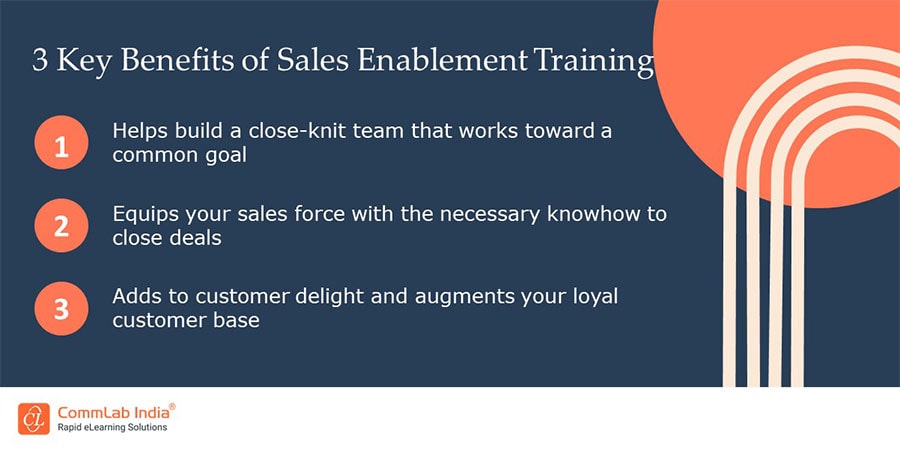How to Turn Potential Leads Into Satisfied Customers — Role of Sales Enablement Training

Businesses need to scale sales to earn profits and thrive. In this competitive era, where new products and services are launched at every blink, organizations must think out of the box to stand out. You might have an awesome offering but making a sale happen is a different ball game altogether. And here sales enablement training comes into play. A well-designed sales enablement training program is crucial to prepare a workforce that’s competent enough to understand the unique customer needs, address them by pitching products that best suit them, and ensure post-sale satisfaction to complete the cycle.In this blog, you will explore the significance of sales enablement training in converting potential leads into satisfied customers and delve into actionable strategies to implement it effectively.
Sales Enablement Training is the Key to Business Success
Here are four impressive strategies to craft an impactful sales enablement training program:
1. Perform Training Need Analysis and Define Clear Learning Objectives
2. Craft Personalized Learning Journeys for Your Learners
3. Use Interactive Instructional Approaches to Awe Learners
4. Ensure Just-in-Time Training
Read on to delve deep.
What is Sales Enablement Training?
Sales enablement training is a comprehensive approach to providing the necessary training, tools, and resources to your workforce to ensure the best customer experience (CX). Sales enablement training is not only for your sales reps. It is for everyone whose contribution leads to fetching and providing services to a customer directly or indirectly. It involves the marketing, sales, customer support, and product teams. It is a targeted solution that aims to empower your employees and support them in engaging prospects and identifying and nurturing potential leads across the different phases of the buying journey.
→ Download Case Study: eLearning Simulations for Sales Training
What are the Benefits of Sales Enablement Training?

Sales enablement training is much more than sales training which majorly focuses on closing deals. The famous motivational speaker and author Brian Tracy, says, “Approach each customer with the idea of helping him or her solve a problem or achieve a goal, not of selling a product or service.” Sales enablement training is all about this. It is a holistic approach that envisions a broad horizon. Let’s dive into the plethora of benefits it offers:
1. Helps Build a Close-Knit Team That Works Toward a Common Goal
An effective sales enablement training program aims to bring different teams together to enhance CX. It encompasses training in various aspects right from marketing a product to making actual sales to providing after-sales support. Consequently, all employees from marketing, sales, customer support, and product teams understand their role in the buyer’s journey and contribute toward the common goal of acquiring and serving customers and ensuring customer delight.
2. Equips Your Sales Force with the Necessary Knowhow to Close Deals
Although marketing, customer support, and product teams do play important roles in enabling sales, the sales team’s role is extremely crucial as they close the sale deals. Naturally, the focus on training the sales team is of utmost importance.
Considering this aspect, sales enablement training programs focus on in-depth analysis of the pain points of sales reps and existing skills gaps. The courses are designed considering these aspects to empower your sales team with the knowledge and skills they need to close potential sale deals. A well-designed sales enablement training program ensures continual upskilling and reskilling of the employees. It encompasses product training, training on improving negotiation skills, and communication skills to solve customer queries and grievances.
3. Adds to Customer Delight and Augments Your Loyal Customer Base
An impactful sales enablement training program ensures that your employees are knowledgeable and understand customer needs and pain points better. For instance, if your marketing team understands the buyer persona, they’ll create content that will address the common pain points of your prospects and customers. Similarly, the sales reps will not only be focused on selling the products but also making more meaningful conversations to offer solutions to the customers’ problems and address their unique needs. This certainly will lead to customer delight, repeat business, and add to your loyal customer base.

How to Design an Impactful Sales Enablement Training Program
Designing an effective sales enablement training program is both an art and a science. While you need to analyze relevant data and statistics to do performance mapping, understanding the training needs of your sales team is equally important to carefully craft personalized learning journeys for your learners. Here are three key strategies to design a sales enablement training program that’ll deliver desired outcomes:
1. Perform Training Need Analysis and Define Clear Learning Objectives
To design a sales enablement training program that delivers desired outcomes, a detailed training need analysis is essential. Aim to establish a training goal and define performance-based learning objectives. It is important to consider the bottlenecks in the current sales process and the areas of improvement. Common KPIs (Key Performance Indicators) for sales enablement are sales cycle length, conversion rate, and sales productivity. Remember aligning sales enablement with the buyer’s journey is crucial for the success of the training program.
Watch this video to learn about the key elements of an impactful sales enablement training program and elevate your sales team.
2. Craft Personalized Learning Journeys for Your Learners
Sales enablement training equips sales teams with the tools, knowledge, and skills needed to effectively engage with leads and guide them through the buying journey. So, it is important to understand the training needs of your sales force and cater to their unique learning needs. You should develop courses that range through the entire employee lifecycle of your sales reps. Sales enablement training for the sales team entails onboarding, training on customer behavior, skills training such as how to pitch a product, negotiate deals, and resolve customer queries, competitor analysis, and more. You should tailor the courses depending on the unique training needs, existing knowledge gaps, and experience of the sales reps.
3. Use Interactive Instructional Approaches to Awe Learners
Designing engaging and interactive courses is the key to the success of the sales enablement training program. Make sure to use modern instructional approaches to deliver content. Microlearning is a wonderful approach to train your on-field sales team. It allows you the scope to use multiple formats such as videos, interactive PDFs, podcasts, and eBooks to deliver content in the form of snackable learning bites. Scenario-based learning is a practical way to teach negotiation skills. It encourages learners to actively participate in situations that mimic real-life work scenarios and hone their critical thinking and decision-making skills.
While gamifying your courses can instill a competitive spirit in your learners alongside adding fun elements to your courses, case studies can provide actionable insights to learners on how to handle complicated customers in case of similar situations.
4. Ensure Just-in-Time Training
When it comes to delivering impactful sales enablement training to your sales force, accessibility plays a crucial role. Your sales force remains scattered and is mostly on the go. Making the training content available at their disposal anytime, anywhere is important for consumption just at the moment of need.
Leverage the mobile-first approach while designing training courses to ensure just-in-time learning. Also, investing in a learning management system (LMS) that hosts, delivers, and manages online courses is instrumental in ensuring easy accessibility of courses. Modern LMSs have learning analytics that can craft personalized learning paths for your learners depending on the past learner behavior and roles and responsibilities of individual learners to ensure meaningful learning.
It's a Wrap!
Sales enablement training plays a crucial role in transforming potential leads into satisfied customers by equipping sales teams with the knowledge, skills, and resources needed to navigate the complexities of the modern sales landscape. By aligning sales enablement strategies with the buyer's journey, leveraging technology for enhanced efficiency, and continuously measuring and iterating strategies for improvement, businesses can empower their sales teams to drive meaningful engagement, overcome objections, and ultimately close more deals. By investing in sales enablement training, you can position yourself for long-term success and sustainable growth in today's competitive business landscape.
When it comes to sales enablement, hands-on training is useful as it provides practical exposure. Here’s a sales and service training case study that showcases how task-based hands-on training with eLearning simulations worked wonders for a logistics major. Trace the journey now!



![5 Strategies for Successful Sales Enablement Training [Infographic]](https://blog.commlabindia.com/hubfs/blogs/strategies-successful-sales-enablement-training-info.jpg)
![Why Should You Consider Microlearning for Sales Training [Infographic]](https://blog.commlabindia.com/hubfs/blogs/microlearning-sales-training-considerations-infographic.jpg)
